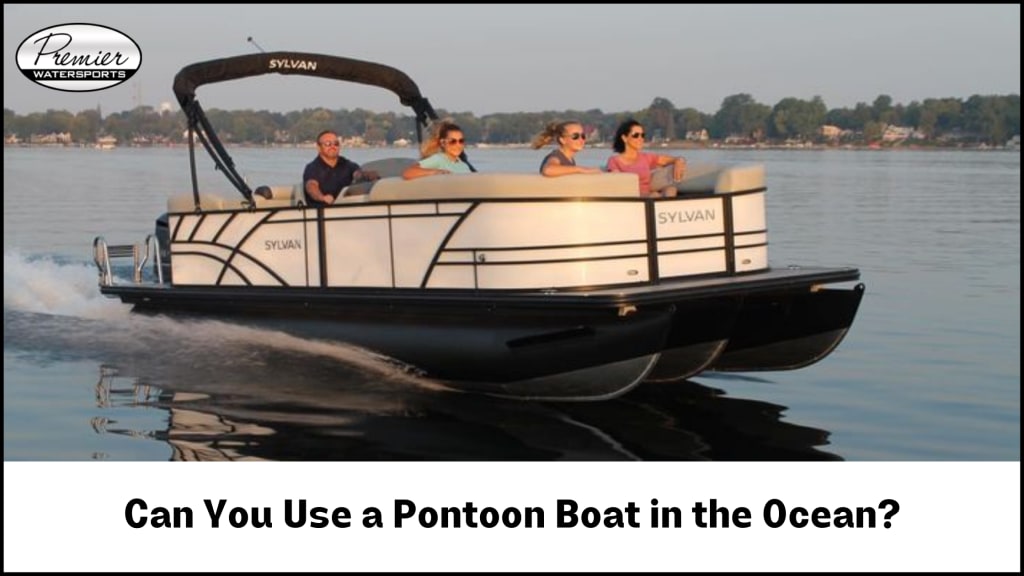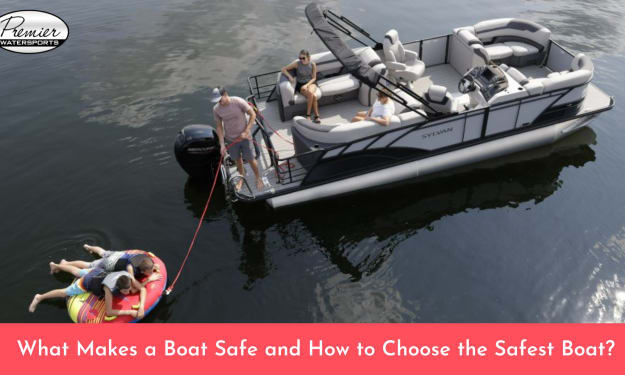Can You Use a Pontoon Boat in the Ocean?
Pontoon boats are the best investment for your next ocean trip. They are the ideal boat for the ocean. But you have to be aware of the weather conditions.

A pontoon boat is an excellent choice for boaters who want a stable, comfortable platform for fishing, cruising, or simply spending time on the water with family and friends. But can you use a pontoon boat in the ocean?
The answer is yes... but there are several things you need to know first. So here's what you need to consider before taking your pontoon boat out into the open water.
Is it Possible to take your Pontoon Boat into the Ocean?
People take their pontoon boats out on the ocean–partly because they are built for inland waterways and because you won't be the first to attempt it, if that's any consolation.
When it comes to taking a pontoon boat out on the water, there are three things you need to consider:
- Safety: The first important thing to consider before taking your pontoon boat into the ocean is safety. It's a good idea to stay near the coast and understand your pontoon boat's capabilities, so you can return if the weather starts to get bad. You should also have a good understanding of the waves and tides in the area. Storms, huge waves, and strong winds should all be avoided while on the water.
- Stability and Performance: If your pontoon boat does not exceed 20 miles per hour, it's quite likely that it will be unable to combat powerful ocean waves. Lifting strakes and a third pontoon can help your performance, but having a powerful engine and even a third pontoon can assist performance.
- Preparation and Maintenance: When you buy a pontoon boat from your dealer, it's likely not prepared for use in the ocean. So read here to know are pontoon boats good for the ocean and how to do it.
Maintenance Required For Your Pontoon Boat To Go On the Ocean
Keep reading if you're wondering how to go ocean-worthy with your pontoon boat. This part will discuss what factors you should consider avoiding harming your pontoon boat while putting it on the sea.
Anodes, Anodes, Anodes
When non-reactive metals are mixed with saltwater, nothing much happens. However, metal corrosion can be quite severe when non-reactive metals are combined with saltwater and electricity.
The death of pontoons is caused by corrosion, which breaks down its components. Therefore, it's critical to keep your pontoon and hull protected.
Anodes are metal components that attach to your boat's hull or motor. They are more reactive than the boat's metal and will corrode before the rest of the vessel.
When anode plates corrode away approximately 50 percent or less, they must be replaced. Anodes should be installed on all pontoons (2 or 3) and your motor for a pontoon boat.
It's essential to check your anodes regularly, especially before putting your pontoon boat in the ocean.
Galvanized Trailer
You may not realize it, but you must submerge your trailer to put your boat into the water. Your trailer is also made of metal. Metal and saltwater are sworn, enemies. Use a galvanized trailer if you're bringing your pontoon boat to the ocean.
Some trailers are hollow, and if water gets inside, it may be impossible to remove the saltwater. In such situations, you must soak the trailer in the water.
However, it is critical to wash or spray off your trailer and pontoon boat regardless of the situation after being in saltwater.
Paint Your Toons
It's true that your pontoons are generally composed of aluminum–and aluminum is quite reactive. So over time, the aluminum will rust if it's not protected.
One way to protect your pontoons is by painting them. The paint will form a barrier between the aluminum and the saltwater. This is an essential step in safeguarding any aluminum boat.
Apply Sharkhide
The sharkhide will assist prevent corrosion and will also prevent any further plant growth from entering the water. You must apply many coats of the substance to achieve the greatest effects.
Sharkhide is a good option for pontoons exposed to the elements. It can be used in addition to paint for the pontoons themselves, but it should only be considered as a protective layer and not relied on alone.
Clean Your Boat With Freshwater Afterward
It is essential to rinse off your boat with fresh water every time you take it out in the ocean. This will help keep the saltwater from building up and damaging your boat.
Just be sure to get all of the saltwater off your pontoon boat. It only takes a small amount of saltwater to cause extensive damage.
Flush Your Motor For a Few Minutes In Freshwater
Because your motor isn't designed to be used in saltwater, putting it in the ocean for an extended period will damage it and cause corrosion. So, after you go in the sea for a while, spend a few minutes flushing the motor with fresh water to protect its longevity.
This is probably the most challenging aspect of the maintenance process, but it's also an opportunity to submerge your trailer and help eliminate any extra saltwater.
Don't Use Your Pontoon Boat As An Electrical Ground
Because a pontoon boat hull is similar to an automobile, it's critical not to use it as a ground. If you do this, you are inviting lots of corrosion since saltwater conducts electricity.
It's also critical to have a secure and robust electrical system that won't contain any stray current, which causes corrosion.
This is one of the essential aspects of keeping a pontoon boat in good condition and ensuring it lasts for a long time.
Is It Safe to Use a Pontoon Boat in Rough Waters?
When handled correctly, a pontoon boat is relatively steady. When handled incorrectly, a pontoon can sink in rough water, but it may be brought back to port without significant problems when it is mastered. This means that pontoons can function well in rough water if you know how to handle them.
However, before you launch your pontoon into the sea, you must understand how to handle the boat if the circumstances deteriorate suddenly.
Below are a few things to bear in mind if you're confronted with huge waves:
- Avoid putting excessive weight on one side of the pontoon. Maintaining a stable distribution of weight is essential for keeping the pontoon level in the water.
- Don't slow down as you approach huge waves. This will make it harder for the pontoon to rise over the top of the wave, and you may get slammed by a large wall of water. The key to surviving in rough conditions is to keep the pontoons above water and avoid putting their nosecones directly into the waves, as this will generate a huge wave that might engulf you.
- If you are caught in a severe storm, the best thing to do is head for shore and ride out the weather. Do not try to brave the conditions, as this could be extremely dangerous.
- Maintain a steady route through the water. Properly riding the waves can make a huge difference in how your boat handles. Instead of sailing straight into the waves, try to steer your boat so that you're approaching them at a 30 to 45-degree angle off the centerline.
By following this advice, you may ensure that your bow stays above the water for long periods during crests and troughs.
What About the Bays and Intracoastal Waterways?
If you plan to take your pontoon out on the open ocean for the first time, it's good to conduct a trial run or two in several bays and Intracoastal waterways.
These waters are generally more sheltered than the open ocean, so you'll be able to get a feel for how your pontoon handles different sea conditions.
The sheltered bays, the Great Lakes, and even the renowned Intracoastal Waterway are fantastic locations for boating on a pontoon. However, the water can be rough in these places during particularly severe weather, so it's not always smooth sailing in these waters.
It's a good idea to take your pontoon for a spin in calm, clear water in a bay or Intracoastal waters to feel how it performs under less protected conditions than those found on lakes or rivers.
Although it isn't a good idea to go out in foul weather, you must be sure that your pontoons can handle worse conditions than you'd expect on a tiny lake before going out on the ocean.
The weather and sea conditions can change rapidly on the open water, and you don't want to be caught off-guard in a storm.
Is a Tritoon More Safe Than a Pontoon in the Ocean?
According to many individuals, a tritoon is thought to be more seaworthy than a pontoon due to its third hull. This is somewhat true but obscures reality. While a third hull may improve your boat's stability and reduce the danger of capsizing, it can only go so far. Pontoons and tritoons have good primary stability but poor secondary stability.
Pontoons and tritoons give up secondary stability – the ability of a boat to right itself at larger angles of the heel – to gain better primary strength - the boat's capability to stay upright at low angles.
Pontoons and tritoons are so stable at rest but can be challenging to handle when waves become large.
While a third hull may help improve your vessel's stability, it is not a guarantee that you will be safe in all conditions. The ideal way to stay safe is to be aware of the conditions and prepare accordingly.
In short, a pontoon boat can be used in the ocean if you are aware of the conditions and know how to handle the boat correctly. For example, if you are confronted with large waves, the best thing to do is head for shore and ride out the storm.
Tritoon boats may be more stable than pontoons, but they are not infallible. The best way to stay safe is to be aware of the conditions and prepare accordingly.
If you plan to use a pontoon boat in the ocean, you must understand the conditions and know how to handle the boat. However, a pontoon boat for sale can be an excellent investment for your next ocean adventure with proper preparation.
Conclusion
A pontoon boat can be used in the ocean if you know the conditions and know how to handle the boat correctly. For example, if you are confronted with large waves, the best thing to do is head for shore and ride out the storm.
Although some pontoons may endure slightly rougher conditions, there are no pontoon boats designed particularly for the open ocean. On the other hand, Pontoon boats are built to cruise on still waters and interior waterways. Still, they can also be utilized in sheltered bays or Intracoastal waterways in mild to moderate weather.
When conditions are ideal and you have the proper knowledge, a pontoon boat can make for a great day out on the water. However, it is essential to be aware of the dangers and always err on the side of caution. Stay safe and have fun!
About the Creator
Premier Watersports
Premier Watersports is Tennessee’s dealer for Supra Wakeboard Boats, Moomba Boats, Yamaha Sport Boats, Starcraft Boats and Sylvan Pontoons, with locations in Knoxville and Nashville.






Comments
There are no comments for this story
Be the first to respond and start the conversation.